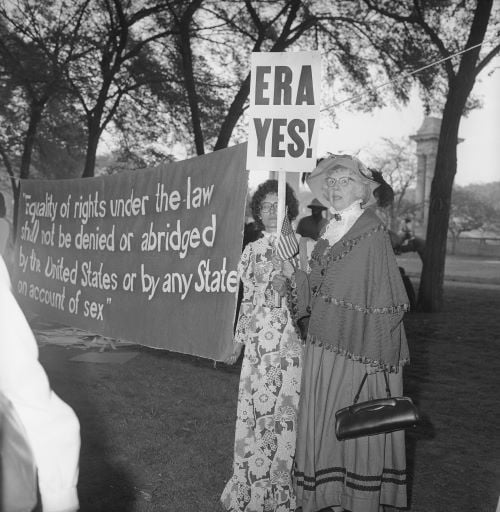Backers of Equal Rights Amendment lose mandamus bid in DC Circuit

Pro-Equal Rights Amendment demonstrators stand by their banner in Chicago’s Grant Park in May 1978. They were waiting for the arrival of then-President Jimmy Carter at a hotel across the street. Photo by LAB/The Associated Press.
The states of Illinois and Nevada lost their bid to make the Equal Rights Amendment part of the Constitution on Tuesday, when the U.S. Court of Appeals for the District of Columbia Circuit ruled that they did not satisfy the high threshold needed to obtain a writ of mandamus.
The D.C. Circuit said the two states failed to show that they had a “clear and indisputable right” to compel the U.S. archivist to certify and publish the ERA as part of the Constitution.
Bloomberg Law has coverage noted by How Appealing, which linked to the Feb. 28 opinion.
The states had contended that the ERA was part of the Constitution because it had been ratified by 38 states as called for in the Constitution. But ratification by the last three of the 38 states didn’t happen by a 1979 deadline set by Congress that was extended to 1982.
In 2018, Nevada became the 36th state to ratify the ERA, followed by Illinois and Virginia. When Virginia urged the archivist to certify and publish the amendment, the archivist asked the Department of Justice’s Office of Legal Counsel for an opinion on the legal status of the ERA.
The Office of Legal Counsel said in a January 2020 opinion the ERA can’t be ratified because of the missed deadline. The opinion said Congress couldn’t extend the deadline, but it could restart the whole process by again proposing the amendment. In January 2022, the office said the prior opinion doesn’t prevent Congress from taking further action regarding ratification because the issue will ultimately be decided by the courts and Congress.
The D.C. Circuit discussed prior U.S. Supreme Court cases supporting the view that Congress has the power to set a ratification deadline.
“The states have not clearly and indisputably shown that the archivist had a duty to certify and publish the ERA or that Congress lacked the authority to place a time limit in the proposing clause of the ERA,” the appeals court said in an opinion by Judge Robert L. Wilkins, an appointee of former President Barack Obama.
One of the judges on the panel is J. Michelle Childs, who was on President Joe Biden’s short list for a Supreme Court nomination in 2022. After the nomination went to now-Justice Ketanji Brown Jackson, Biden nominated Childs to the D.C. Circuit.
The third panel member, Judge Neomi Rao, is an appointee of former President Donald Trump.
The ERA provides that: “Equality of rights under the law shall not be denied or abridged by the United States or by any state on account of sex.”
The amendment also says Congress has the authority to enforce the amendment by appropriate legislation.
Republican Alabama Attorney General Steve Marshall called the D.C. Circuit’s decision “a significant victory for the rule of law” in a press release.
Alabama was one of five states that intervened in the litigation to oppose ratification of the amendment.
Linda Coberly, who chairs the ERA Coalition’s legal task force, told Bloomberg Law that the decision “does not resolve whether the time limit is effective or enforceable. What it does is kick the issue back to Congress.”
Coberly said the Senate Judiciary Committee had a hearing Tuesday to discuss a resolution that removes the time limit and recognizes the amendment as valid.



